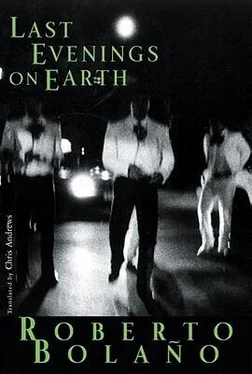B spends the following days wandering around the streets of Paris. Sometimes he comes to the entrance of a museum, but he never goes in. Sometimes he comes to a movie theater and stands there examining the posters at length, then walks on. He buys books, which he browses through but never reads to the end. He eats in a different restaurant every time and lingers after his meals, as if he were not in Paris but out in the country and had nothing better to do than smoke and drink chamomile tea.
One morning, after a couple of hours' sleep, B takes a train to Brussels. He has a friend there, a black girl, the daughter of a Chilean exile and a Ugandan woman, but he can't bring himself to call her. He walks around central Brussels for hours and then into the northern suburbs until he finds a little hotel on a street where there is virtually nothing else. Next to the hotel is a fenced-off vacant lot where grass and garbage are thriving. Opposite is a row of mostly unoccupied houses that look as if they have been bombed. Some have broken windows and shutters hanging precariously as if the wind had unhinged them, but there is practically no wind in this street, thinks B, looking out the window of his room. He also thinks: I should rent a car. And: I don't know how to drive. The next day he goes to see his friend. Her name is M and she is living on her own now. He finds her at home, wearing jeans and a T-shirt. She is barefoot. When she sees him, for the first few seconds she can't remember who he is. She speaks to him in French and looks at him as if she knows that he is going to do her harm, but doesn't care.
After a moment's hesitation, B says his name. He speaks in Spanish. I'm B, he says. Then M remembers him and smiles, though not because she is particularly happy to see him; it is more that B's sudden appearance, something she hadn't even considered as a possibility, comes as an amusing if perplexing surprise. In any case, she invites him in and offers him a drink. They talk for a while, seated opposite each other. B asks about her mother (her father died a while ago), her studies, her life in Belgium. M replies obliquely and asks about B's health, his books, his life in Spain.
Finally they run out of things to say and sit there in silence. Silence suits M. She is tall, slim, and about twenty-five. Her eyes are green, the same color as her father's. Even the rings under her eyes, which are very pronounced, remind B of the exiled Chilean he met many years ago (he can't remember how many years, nor does it matter) when M was a little girl, about two, and her parents (her mother was studying politics, though she didn't finish her degree) were traveling through France and Spain on a shoestring, staying with friends.
For a moment he imagines the three of them, M's father, her mother, and M at the age of two or three, with her green eyes, surrounded by precarious suspension bridges. Her father was never really a close friend of mine, thinks B. There were never really any bridges, not even precarious ones.
Before leaving, he gives her the name and the telephone number of his hotel. When night comes he walks through the center of Brussels in search of a woman but all he can see are ghostly figures; it's as if the bureaucrats and bank tellers had all stayed late and were just leaving work. When he returns to his hotel he has to wait a long time before someone comes to the door. The porter is a haggard young man. B gives him a tip and climbs the dark staircase to his room.
The next morning he is woken by a phone call from M. She invites him to breakfast. Where? asks B. Wherever, says M. I'll come and pick you up and then we can go somewhere. As he is getting dressed, B thinks of Julia Nys, Le-febvre's mother, who illustrated some of her son's last texts. They lived here, he thinks, in Brussels, in a house somewhere in this part of the city. A gust of wind is blowing in his memory, blurring the houses he has seen. After shaving, B looks out the window at the facades of the neighboring houses. Everything is the same as yesterday. A middle-aged woman, perhaps only a few years older than B, is walking down the street, dragging an empty shopping cart. A few yards in front of her, a dog has stopped, with his muzzle raised and his eyes, like slots in a cash drawer, fixed on one of the hotel's windows, perhaps the one from which B is looking out. Everything is the same as yesterday, thinks B as he puts on a white shirt, a black jacket, and a pair of black trousers. Then he goes downstairs to wait for M in the lobby.
What do you make of this? B asks M, once they are in the car, showing her Lefebvre's pages in Luna Park. It looks like bunches of grapes, says M. Can you read the writing? No, says M. Then she looks at Lefebvre's scribbles again and says that maybe he is talking about existence. maybe. But in fact she is the one who talks about existence that morning. She says her life is one error after another; she tells him that she has been very sick (what with, she doesn't say) and describes a trip to New York that sounds more like a descent into hell. M's Spanish is larded with French and her face remains expressionless throughout the monologue, except when she allows herself a smile to underline the farcical nature of this or that situation, as she sees it, although nothing, thinks B, could be further from farce.
They have breakfast together in a cafй on the rue de l'Orient, near the church of Notre-Dame l'Immaculйe, a church M seems to know well, as if she had recently converted to Catholicism. Then she says she's going to take him to the Natural History Museum, next to Leopold Park and the European Parliament, a location that strikes B as paradoxical — though he can't say why when pressed to explain — but first, M informs him, she has to go home and get changed. B has no desire to visit a museum of any sort. And he can't see why M needs to change her clothes. He says so. M bursts out laughing. I look like a junkie, she says.
While M gets changed, B sits in an armchair and starts leafing through Luna Park, but soon he gets bored, as if Luna Park and M's small apartment were incompatible. So he gets up and starts looking at the photos and pictures on the wall, and then the single, sparsely laden bookshelf and the few Spanish books on it, among which he recognizes the works of M's father, which M, in all likelihood, has never read: political essays, a history of the coup, a book about the Mapuche communities, and B smiles, taken aback, feeling a slight twinge of emotion, though what it is he doesn't know, tenderness perhaps or disgust or simply a warning that something is wrong. Then suddenly M appears in the room or rather she walks across it from her bedroom to what must be the bathroom door, unless it's the laundry where her clothes are hanging, and B watches her cross the room half-naked or half-clothed, a sight which along with her dead father's old books seems to constitute a sign. A sign of what? He doesn't know. An ominous sign, in any case.
When they leave the apartment, M is wearing a dark, close-fitting, knee-length skirt, a white shirt with the top buttons undone, showing some cleavage, and high heels that make her at least an inch taller than B. As they head toward the museum, M talks about her mother and points to a building, which they pass without stopping. B doesn't understand until the building is five blocks behind them: M's mother, the widow of the exiled Chilean, lives there, in one of the apartments. Instead of asking about her, as he would like to, he says he really doesn't feel like visiting a museum, and especially not some awful Natural History Museum, of all things. But his feeble resistance is no match for M, who has suddenly become energetic while retaining a certain frosty air, and he lets himself be dragged along.
Another surprise is waiting for him. When they reach the museum, M pays for the tickets, then sits down to wait for him in the cafй with a newspaper and a cappuccino, her legs crossed in a pose that is at once elegant and solitary, and the sight makes B (who has turned back to look at her) feel old, in a rather abstract way. Then B walks from room to room until he comes to one in which he finds several curvilinear machines. What is going to happen to M? he wonders as he sits down, resting his hands on his knees, with a slight twinge of pain in his chest. He feels like a cigarette, but smoking is prohibited. The pain grows stronger. B shuts his eyes but can still see the silhouettes of the machines, persisting like the pain in his chest, although perhaps they are not machines but bewildering figures, the human race suffering and laughing as it marches toward the void.
Читать дальше












